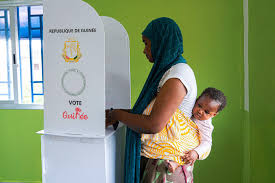
Guinea has provisionally adopted a new constitution after a nationwide referendum held on 21 September 2025, marking a significant milestone in the country’s political transition.
The announcement was made on Tuesday by Territorial Administration Minister Ibrahima Kalil Condé in Conakry, who declared the draft constitution “provisionally adopted” following a decisive “Yes” vote.
According to official figures, 5,135,951 voters, representing 89.38% of valid votes, supported the new constitution, while 610,376, or 10.62%, opposed it.
The referendum saw a turnout of 86.42%, with 5,951,807 of 6,768,458 registered voters participating across 412 electoral districts.
“This draft new constitution submitted to the people for approval by referendum is provisionally adopted,” Minister Condé said during the proclamation of results.
The vote took place in 16,722 polling centers, operating 22,681 offices out of 23,662 planned, with 205,480 ballots, or 3.45%, declared invalid.
The referendum forms a key part of Guinea’s ongoing political transition under Transitional President General Mamadi Doumbouya.
The draft, presented to Doumbouya in June by the President of the National Transitional Council, Dr. Dansa Kourouma, proposes a seven-year presidential term renewable once, the establishment of a Senate, and allows Doumbouya to contest the next presidential election.
Minister Condé emphasized that “in accordance with legal procedure, these provisional results will be transmitted to the Supreme Court, the only institution competent to examine them, hear any disputes, validate them and announce the final results.”
He also reaffirmed the government’s commitment “to working towards a transparent, credible electoral process that conforms to the democratic principles of our Republic.”
The provisional adoption of the constitution represents a major step in Guinea’s transitional roadmap, pending final validation by the Supreme Court. Observers note that the outcome strengthens the legal framework for upcoming elections and signals a potentially transformative phase in Guinea’s governance.
With this development, Guinea edges closer to consolidating its transitional reforms while preparing for the next phase of democratic processes.



